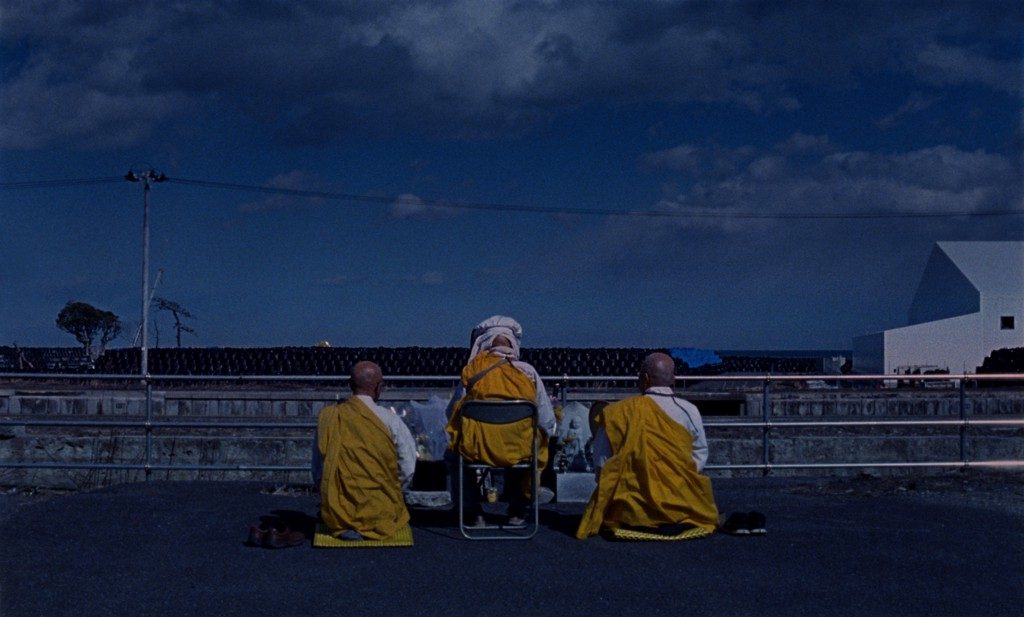Francesca Scalisi is an Italian director and editor. She is a co-founder of “Dok Mobile,” a film production company based in Switzerland. In 2015, she directed and produced the short film, “Moriom,” which received Special Mention at the Winterthur Kurzfilmtage Film Festival and screened at IDFA, Tampere Short-Film Festival, and Thessaloniki documentary film festival, among others. With Mark Olexa, Scalisi is the co-creator and artistic director of the “Flying Film Festival,” the first film festival entirely held in the sky. It is a short-film competition taking place on Swiss Airlines’ long-haul flights, with the passengers as spectators and judges. (Press materials)
“Half-Life in Fukushima” will premiere at the 2016 Hot Docs Film Festival on May 2.
W&H: Describe the film for us in your own words.
FS: “Half-Life in Fukushima” is a meditative documentary that takes the audience to the heart of the forbidden zone around the Fukushima Daiichi nuclear plant, five years after the disaster.
In order to look after the abandoned animals that inhabit this new world, Naoto Matsumura decides to confront the invisible threat embodied by the ghost-town of Tomioka.
“The last man in Fukushima” lives in silence and solitude, and constant reminders of a half-lived life — as a sacrifice for the land that he cannot stop calling home.
W&H: What drew you to this story?
FS: A book by the Italian journalist Antonio Pagnotta caught our attention — a book about Naoto Matsumura, the last man living in Fukushima. We were fascinated by his silent resistance in the contaminated zone. We wanted to understand why this man had decided to carry the sins of mankind on his shoulders. For us, it was a way to portrait sacrifice, solitude, and absurdity of life.
W&H: What do you want people to think about when they are leaving the theater?
FS: When people leave the theater, I don’t want them to think about anything. Hopefully they will still be immersed in the meditative atmosphere created by the movie. Only afterwords should they start to ask themselves questions about what they have seen.
This film is not a condemnation of nuclear power. It isn’t a protest. The documentary whispers: “As human beings, we are bound to our land. We can understand our existence only in relation to the entity we belong to.”
W&H: What was the biggest challenge in making the film?
FS: For me, the biggest challenge was the editing. Usually when I edit I try to put the emphasis to the dramaturgy of the story. However, in this case, it was almost the opposite. I started to dismantle dramaturgy, favoring a the creation of a particular atmosphere rather than a story.
W&H: How did you get your film funded? Share some insights into how you got the film made.
FS: I’m Italian but I live in Switzerland, where the movie industry is well supported by the government. Our movie was produced with the support of OFC (Swiss Film Institute), Cineforom (Regional Fund of Romandie), Region Rhone Alpe (Regional fund in France), and “Education 21 film pour un seul monde,” a foundation that helps to develop movies that deal with sustainable development. Unfortunately, this foundation does not support any more documentaries. I wish there were more associations, organizations, private, and national funds that support creative work. After all, art is the food for the soul.
W&H: What’s the best and worst advice you’ve received?
FS: “The meaning of letting cinema come into your life is this: to understand the missing link between things and names, names and characters, characters and stories.” That’s the best advice I have received.
The worst advice — I really can’t remember. I’m good at forgetting bad stuff!
W&H: What advice do you have for other female directors?
FS: This is my advice to female directors: Don’t convey messages. Convey emotions!
W&H: Name your favorite woman-directed film and why.
FS: I’m in love with all of Claire Denis’ films. There is always an ontological mystery buried in the mundane.There are situations, bodies, and objects to discover. Denis scatters questions around, and gives us many possible answers. At the same time, she is also able to test the film as a narrative tool.







